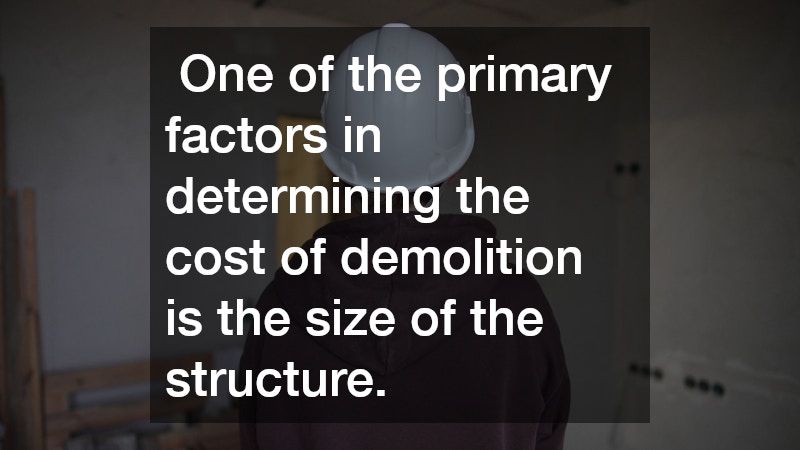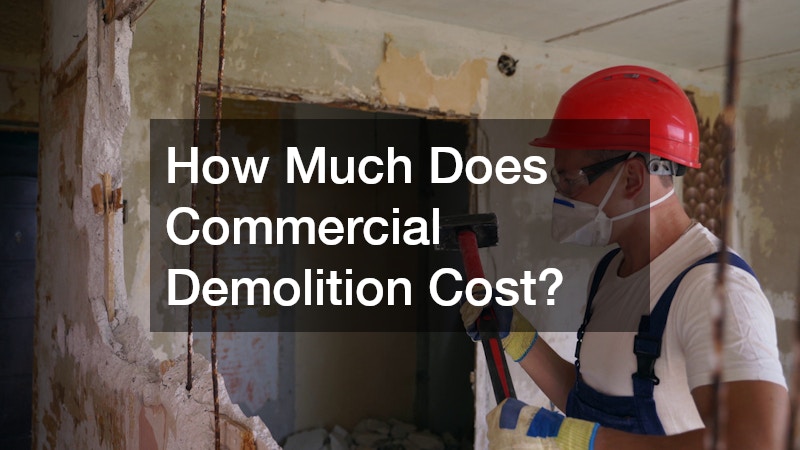Commercial demolition involves dismantling commercial properties while ensuring adherence to strict safety regulations. The cost of commercial demolition services can vary widely based on several factors. Primarily, it involves labor costs, equipment rental, disposal fees, and other miscellaneous expenses.
One of the primary factors in determining the cost of demolition is the size of the structure. Larger buildings require more time and effort to demolish, consequently increasing the cost. Moreover, removing the debris is a crucial aspect and can significantly affect the overall expenses.
The complexity of the structure is another vital consideration when estimating demolition costs. Buildings with intricate designs or those constructed with reinforced materials can be more challenging to demolish. As a result, additional time and specialized equipment may be necessary, which can drive up expenses.
Key Factors Impacting Demolition Costs
The type of demolition also plays a significant role in determining the overall cost. Partial demolition, which involves removing only a part of the structure, might be cheaper compared to complete demolition. However, it requires precision work, which can sometimes even escalate costs.
Similarly, the location of the structure is critical. Buildings in urban areas might incur higher demolition costs due to logistical challenges, such as restricted access and limited space for containing debris. In contrast, rural areas might have lower demolition prices but could face their own set of logistical issues.
Environmental considerations also impact demolition costs. Handling hazardous materials such as asbestos or lead involves additional safety measures and disposal protocols. Environmental assessments and remediation efforts can add substantial costs to the demolition process.
The Role of Contractors in Demolition Pricing
Hiring experienced commercial demolition services is crucial for a successful project. Skilled contractors are knowledgeable about the complexities involved in safely bringing down a structure. Their experience allows them to predict potential issues and efficiently manage resources, leading to optimized costs.
When selecting a contractor, comparing quotes from multiple service providers is essential. This comparison can provide insights into standard industry rates and help identify any unusually high or low pricing. However, opting for significantly lower quotes might mean compromising on quality and safety standards.
Reliable contractors will include a detailed breakdown of costs in their estimates, which helps in transparent billing. This trust-building measure ensures that property owners know what they are paying for and can plan their budgets accordingly. Additionally, contracting with reputable providers can safeguard against unexpected surcharges.
Additional Costs to Consider in Demolition Projects
Legal permits represent another layer of cost in commercial demolition projects. Depending on the local regulations, securing the necessary permits can vary significantly in price. Engaging with local authorities early on can provide clarity on these requirements and prevent costly legal issues later.
Another hidden cost can be the post-demolition site preparation. Before any new construction can begin, the site may need to be leveled, grade adjusted, or environmentally remediated. These efforts ensure the ground is perfectly suited for its new purpose and can significantly affect the budget.
Contingency expenses are a vital part of demolition budgeting. Unexpected issues, such as foundational surprises or undiscovered hazardous materials, can arise during the demolition. Maintaining a contingency fund helps project managers handle such unforeseen expenses without financial overrun.
Estimating the true cost of commercial demolition services requires careful consideration and planning. While several variables can affect pricing, a thorough assessment of the structure and its surroundings provides a more accurate cost prediction. Awareness and preparation are essential for minimizing unforeseen financial burdens.
Effective communication with contractors and understanding their proposals can lead to a well-managed demolition process. Aligning project expectations with realistic budgets helps manage resources efficiently and achieves desired demolition outcomes. Opting for experienced and transparent service providers further ensures a smooth project flow.
Ultimately, while commercial demolition can seem daunting and expensive, strategic planning and the right partners can mitigate costs. By understanding all facets of the demolition project, property owners can reduce risks and facilitate successful redevelopment or renovation plans within budgetary constraints.


